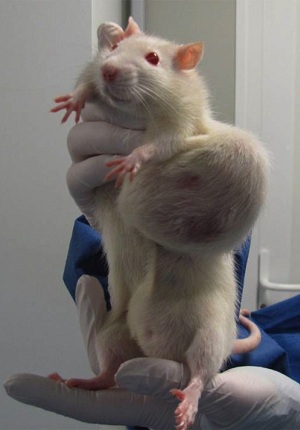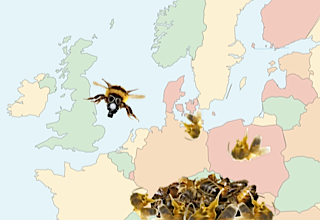Both genetically modified maize and the products developed to treat it are inherently toxic. Last week saw the publication of an independent long-term scientific study that puts the toxicity of glyphosate and GM maize beyond reasonable doubt.
The results of a study by a group of international scientists led by Dr Gilles-Eric Seralini were published last Wednesday in the peer-reviewed journal Food and Chemical Toxicology. The six-year programme tested for the effects of a GM diet separately from Roundup ingestion as well as the combined effects over the two-year lifespan of laboratory rats.
The products tested are a GM crop with characteristics shared by more than 80% of food crop GMOs and the most widely-used weedkiller on the planet. “The results are alarming,” the researchers warn. Laboratory mortalities “…are more rapid and more numerous…” among animals receiving both a GM diet and glyphosate-tainted water.

Many of the female rats developed breast tumours and renal disorders, while the males presented chronic renal conditions. The lifespan research explodes the commercially convenient findings based on 90-day testing periods used in manufacturer-controlled trials.
“The implications are enormous,” Seralini explains. The researchers now have a better understanding of how the most widely-grown GMO acts on living tissue and have found that even low concentrations of glyphosate such as might be found in surface water or drinking water can be toxic. “What is more, the results shine a light on the laxity of health agencies and manufacturers in the evaluation of these products,” Seralini adds.
GM-Free Cymru welcomed the publication and suggested that glyphosate manufacturers must be sitting on similar long-term studies themselves. “It is inconceivable that Monsanto’s research teams have not conducted long-term feeding trials behind the scenes, and it is inconceivable that they have been unaware of the appalling damage done to mammalian organs by both Roundup and GM maize,” declared Dr Brian John.
Given the importance of the study, its treatment in the English-speaking media has been lamentably skewed in places. The broad-brush treatment of the story by BBC science correspondent Jonathan Amos has sparked a complaint to the corporation by Dr John, in the absence of a response from the journalist to correspondence on the subject.
Arguing that the BBC “…buried a story which has huge global consequences…” John accused the corporation of publishing: “…a highly distorted piece designed to mislead.”
A strongly opinionated Forbes hatchet job typifies US incredulity, suggesting that the prevalence of GM food in the mainstream food supply would have already triggered observable effects in laboratory populations. Hardly a scientific rebuttal, that one.
To suggest, as Hank Campbell does on the Science 2.0 website, that it is somehow normal for the Sprague Dawley laboratory rats used in the Seralini tests to develop a high incidence of massive tumours anyway is nothing short of monstrous. Unless, of course, it is the anecdotal observable effect that Tim Worstall had not noticed when writing the Forbes article.
The In Vivo study documentation is easier to follow in the French section of the CRIIGEN website. This is understandable, given the sensitivity of the French source documents and the limited number of suitably experienced people available to carry out translations.
It helps to know, for instance, that the planned French book Tous Cobayes ! (We’re All Guinea Pigs!) echoes the title of a popular French television series “On n’est que des Cobayes ! (We’re Only Guinea Pigs!).





